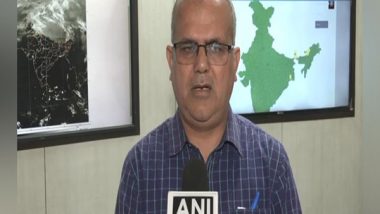New Delhi, February 19: The India Meteorological Department (IMD) on Sunday issued a warning for heat wave in the isolated coastal region specifically in Konkan and Kutch area of Gujarat for the next two days.
Speaking to ANI, IMD Scientist Dr Naresh said, "Presently, one Western Disturbance is likely to affect the western Himalayan region from today. It will impact the weather in the entire Jammu and Kashmir region today and eventually start affecting Himachal Pradesh and Uttarakhand from tomorrow, especially for the next two days." Tamil Nadu Rains: IMD Issues Heavy Rainfall Warning in Southern Districts, Holiday Declared for Schools and Colleges (Watch Video).
He further said that the Pathankot area in Northern Punjab is likely to get light isolated rainfall in two to three days. Talking about the weather conditions, he said that the minimum and maximum temperature in the country is already 'above normal' in most parts of the country. "If you talk about the temperature rise in northwest India, it usually happens there when there is a dry spell of weather," he added. Maharashtra Rain Update: IMD Issues Orange Alert Till August 11; Mumbai, Thane To Receive Heavy Rainfall.
"We have issued statements in the last few days about the temperature reaching between 37 and 39 degrees celsius in the west coast or Gujarat region, so isolated heat waves may prevail in the coastal region. We have issued a heatwave warning for the next two days in the Konkan and Kutch region except for the Western Himalayas where there is no significant variation," he said further.
Later in his conversation with ANI, Dr Naresh talked about the highest minimum and maximum temperature in Shimla and said that it would continue today, but a slight fall in temperature is expected under the influence of western disturbances.
"Shimla will continue experiencing the minimum and maximum temperature today, however, under the influence of western disturbance, we are expecting the temperature to slightly fall over these regions from tomorrow onwards," he said.
On being asked if the weather in Shimla is an outcome of climate change, he said, "Generally this is an unusual temperature, but whenever there is dry or no weather then we can expect the temperature to rise above normal. However, we would need long-term data to say anything about climate change. We can call it climate change only if such conditions persist for long terms."
Addressing the issue of fog in the Southern part of the country, the IMD scientist said that the region is not witnessing 'dense fog' and termed it shallow with quite high visibility.
"The fog we are witnessing in the Southern region is not dense fog. It is a shallow fog and the visibility is quite high which prevails when there is humidity. If you talk about the Chennai region, there was about 80 per cent humidity which influenced this shallow fog.
In Northwest India, one or two stations are experiencing dense fog in the morning, and this is also because the temperature here has been more than 10 degrees, he said.
Dr Naresh said that we often experience dense fog when there is a calm wind and quite high humidity, and since it is prevailing in the Northwest, we have issued warnings in Punjab and Haryana for the next 24 hours. It may prevail till Monday, he added.
In the national capital, the minimum temperature is already above 10 degrees but due to western disturbances, it may fall by one degree, however, there may be no significant change in weather over Delhi-NCR, he expressed.
(The above story is verified and authored by ANI staff, ANI is South Asia's leading multimedia news agency with over 100 bureaus in India, South Asia and across the globe. ANI brings the latest news on Politics and Current Affairs in India & around the World, Sports, Health, Fitness, Entertainment, & News. The views appearing in the above post do not reflect the opinions of LatestLY)













 Quickly
Quickly


